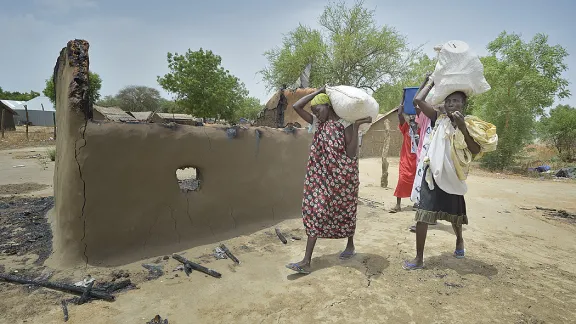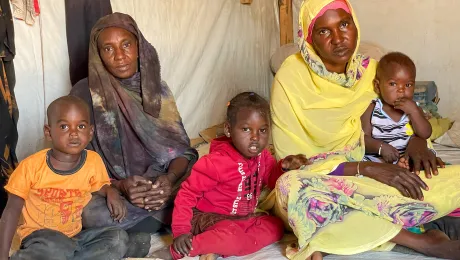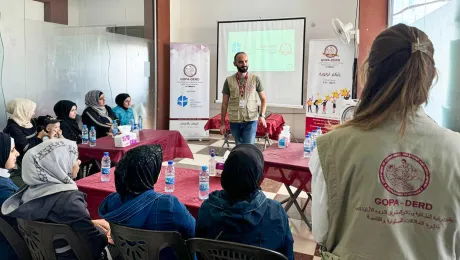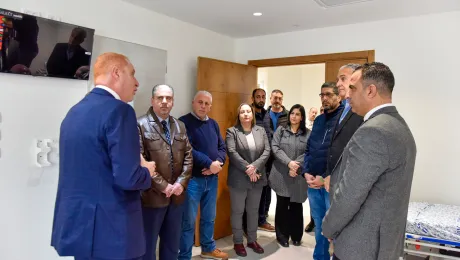
The security of aid workers is increasingly under threat in dangerous environments such as South Sudan. Photo: Paul Jeffrey
Interview with LWF security adviser Susan Muis
The earthquake in Nepal, carjacking, abduction and detention. In the past six months, LWF staff have faced many challenging situations. Susan Muis, Program Officer for Central Africa and newly appointed security adviser for The Lutheran World Federation (LWF) talks about how insecurity has changed the humanitarian work and the importance of good preparation and staff care.
Lutheran World Information (LWI): In your experience, how has the work environment for aid workers changed in the past years?
Susan Muis: It has changed a lot. The humanitarian principles of being impartial and neutral are, in certain contexts, severely challenged by perceptions of us. Are we seen as being neutral? A turning point was the attack on the United Nations in Baghdad in 2003. That day it became clear that the UN was not seen as neutral by certain parties. Twenty years ago aid workers could safely deliver humanitarian assistance by maintaining good relations with local communities and leaders in insecure environments. Today aid workers have become a soft target for criminals because they are not armed and carry valuable laptops and cellphones. When looking at the statistics, I also find that national staff are more at risk
What makes the position of national staff more difficult?
The statistical increase is partly due to the fact that organizations invest in local capacity-building by employing more national staff. So there are more national aid workers in comparison with international aid workers. But national staff are also vulnerable due to their status as employees of an aid organization and the additional risks they might face due to ethnicity or gender.
National staff often work close to the local population in areas that are also potentially dangerous for them. For example, in South Sudan the situation for our staff became very threatening when a refugee camp was suddenly surrounded by rebels. As the conflict was around ethnic lines, that meant a specific threat to national staff belonging to certain groups. In these situations we need to relocate national staff to another area in the country, which requires a lot of flexibility and stress tolerance of our staff.
Which situations would you consider most dangerous?
In my experience, and confirmed in the Aid Workers Report 2014, aid workers are most vulnerable when travelling on the road, because that makes them possible targets for ambush and road side attacks.
In the past six months LWF also had incidents where staff were abducted, detained, and even shot at. Worldwide the number of conflicts and the humanitarian needs have increased dramatically. We cannot respond to all but we try to serve people as best as we can. We know we ask a lot of our staff and churches who sometimes take high risks to help people in need that are located in a dangerous area.
How do we mitigate risk?
One of our risk reduction strategies is the so-called acceptance strategy. We work with local structures, churches and others close to the communities we serve. When the team is accepted by the communities, the locals will tell you sooner when something goes wrong. They might hide you when armed groups enter the village.
However acceptance is not sufficient today, so more and more organizations like LWF are focusing on putting protection mechanisms in place for staff and assets. These include access to local security networks, security awareness training for field staff, safety and security policies, plans and procedures, and guards in front of field offices. Nevertheless, we work hard to balance this with the fact that we are there to serve and be alongside local people. We don’t want to shut ourselves off.
How does this work environment affect staff?
LWF works in many high risk countries with a rapidly changing security situation – e.g. the Central African Republic, South Sudan, Chad, the Democratic Republic of the Congo, Burundi, northern Kenya, Iraq and Colombia. In most of them we have complex conflicts with many parties and rebel groups which make the working environment very stressful and unpredictable. We are aware that this rapidly changing environment needs a lot of flexibility from our staff, donors and beneficiaries. I have a lot of respect for people who work under this constant pressure.
Four months ago, LWF staff in Nepal faced insecurity caused by a natural disaster. What specific risks did they have to deal with?
During natural disasters, there might be looting and violent attacks. That happened after the Haiti earthquake, and our staff in Nepal also faced critical situations when people wanted to steal relief goods. In Nepal most of the safety and security risks were in relation to aftershocks and landslides. LWF staff have experienced more than 50 aftershocks in the months after the earthquake. These cause not only dangerous situations like collapsing buildings but can also have a big impact emotionally. An earthquake can be a very traumatic experience, and that memory comes back with every aftershock.
In Nepal many members of our team and the local ACT forum were directly affected. Their houses had been damaged or had even collapsed, so they were staying with relatives in very crowded apartments. Their loved ones were injured. They were worried about children or elderly parents who had to live in the open air. Yet they showed a lot of commitment and drive, coming to the office every morning and on the weekends to help others.
How were staff supported in this situation?
In life-threating crisis situations you see two different types of people – those who are very active, who use their own trauma to help others as a healing mechanism. Others might be more afraid and passive and could get psychosocial problems like depression, insomnia and post-traumatic stress disorder. Both need support, and we take that very seriously.
In Nepal, apart from material support to help people find shelter and rebuild their lives, the ACT Nepal forum recruited a Security Focal Person to provide travel advice, and develop safety and security instructions. A team of psychosocial support staff was sent to Nepal soon after the earthquake to support the team. This “aftercare” is crucial for the healing process. Humanitarian workers are very committed people, they believe in the work they do, and when something happens and they are involved in an incident, we should give them all the support we are able to provide.


